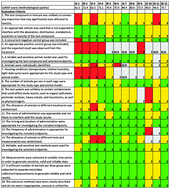Making the most of expert judgment in hazard and risk assessment of chemicals
Abstract
Evaluation of the reliability and relevance of toxicity and ecotoxicity studies is an integral step in the assessment of the hazards and risks of chemicals. This evaluation is inherently reliant on expert judgment, which often leads to differences between experts’ conclusions regarding how individual studies can contribute to the body of evidence. The conclusions of regulatory assessment, such as establishing safe exposure levels for humans and the environment and calculations of margins of exposure, may have large consequences for which chemicals are permitted on the market and their allowed uses. It is therefore important that such assessments are based on all reliable and relevant scientific data, and that assessment principles and assumptions, such as expert judgment, are transparently applied. It is not possible nor desirable to completely eliminate expert judgment from the evaluation of (eco)toxicity studies. However, it is desirable to introduce measures that increase structure and transparency in the evaluation process so as to provide scientifically robust risk assessments that can be used for regulatory decision making. In this article we present results from workshop exercises with Nordic experts to illustrate how experts’ evaluations regarding the reliability and relevance of (eco)toxicity studies for risk assessment may vary and discuss methods intended to promote structure and transparency in the evaluation process.

- This article is part of the themed collection: Toxicology Research 2017 Most Downloaded Articles


 Please wait while we load your content...
Please wait while we load your content...